Le Present (Present Tense) Conjugation of the French Verb pourfendre
Introduction to the verb pourfendre
The English translation of pourfendre is “to cleave” or “to split.” It is pronounced as “poor-fend-ruh.”
Pourfendre comes from the Old French word “porfendre,” which is derived from the Latin word “perfindere” meaning “to pierce through.” Most often, pourfendre is used in everyday French to describe the act of cutting or splitting something with force.
Examples:
1) Je dois pourfendre ce bois pour faire du feu. (I have to split this wood to make a fire.)
2) Il a réussi à pourfendre la défense adverse et marquer un but. (He managed to split through the opposing defense and score a goal.)
3) La hache a pourfendu la porte en deux. (The axe cleaved the door in half.)
Pourfendre – About the French Present Tense
To take a deep dive into all the French tenses then see our article on Mastering French Tense Conjugation.
Common Everyday Usage Patterns For Le Present
Interactions with Other Tenses
Table of the Present Tense Conjugation of pourfendre
| Pronoun | Conjugation | Short Example | English Translation |
|---|---|---|---|
| je | pourfends | Je pourfends l’ennemi. | I cut down the enemy. |
| tu | pourfends | Tu pourfends la viande. | You cut the meat. |
| il | pourfend | Il pourfend le bois. | He cuts through the wood. |
| elle | pourfend | Elle pourfend le silence. | She breaks the silence. |
| on | pourfend | On pourfend les préjugés. | We break down prejudices. |
| nous | pourfendons | Nous pourfendons l’obscurité. | We cut through the darkness. |
| vous | pourfendez | Vous pourfendez le tronc. | You cut the trunk. |
| ils | pourfendent | Ils pourfendent l’air. | They cut through the air. |
| elles | pourfendent | Elles pourfendent les vagues. | They cut through the waves. |
Other Conjugations for Pourfendre.
Le Present (Present Tense) Conjugation of the French Verb pourfendre (this article)
Imparfait (Imperfect) Tense Conjugation of the French Verb pourfendre
Passé Simple (Simple Past) Tense Conjugation of the French Verb pourfendre
Passé Composé (Present Perfect) Tense Conjugation of the French Verb pourfendre
Futur Simple (Simple Future) Tense Conjugation of the French Verb pourfendre
Futur Proche (Near Future) Tense Conjugation of the French Verb pourfendre
Plus-que-parfait (Pluperfect) Tense Conjugation of the French Verb pourfendre
Passé Antérieur (Past Anterior) Tense Conjugation of the French Verb pourfendre
Futur Antérieur (Future Anterior) Tense Conjugation of the French Verb pourfendre
Subjonctif Présent (Subjunctive Present) Tense Conjugation of the French Verb pourfendre
Subjonctif Passé (Subjunctive Past) Tense Conjugation of the French Verb pourfendre
Subjonctif Imparfait (Subjunctive Imperfect) Tense Conjugation of the French Verb pourfendre
Subjonctif Plus-que-parfait (Subjunctive Pluperfect) Tense Conjugation of the French Verb pourfendre
Conditionnel Présent (Conditional Present) Tense Conjugation of the French Verb pourfendre
Conditionnel Passé (Conditional Past) Tense Conjugation of the French Verb pourfendre
L’impératif Présent (Imperative Present) Tense Conjugation of the French Verb pourfendre
L’infinitif Présent (Infinitive Present) Tense Conjugation of the French Verb pourfendre
Struggling with French verbs or the language in general? Why not use our free French Grammar Checker – no registration required!
Get a FREE Download Study Sheet of this Conjugation 🔥
Simply right click the image below, click “save image” and get your free reference for the pourfendre Present Tense tense conjugation!

I hope you enjoyed this article on the verb pourfendre. Still in a learning mood? Check out another TOTALLY random French verb present conjugation!


